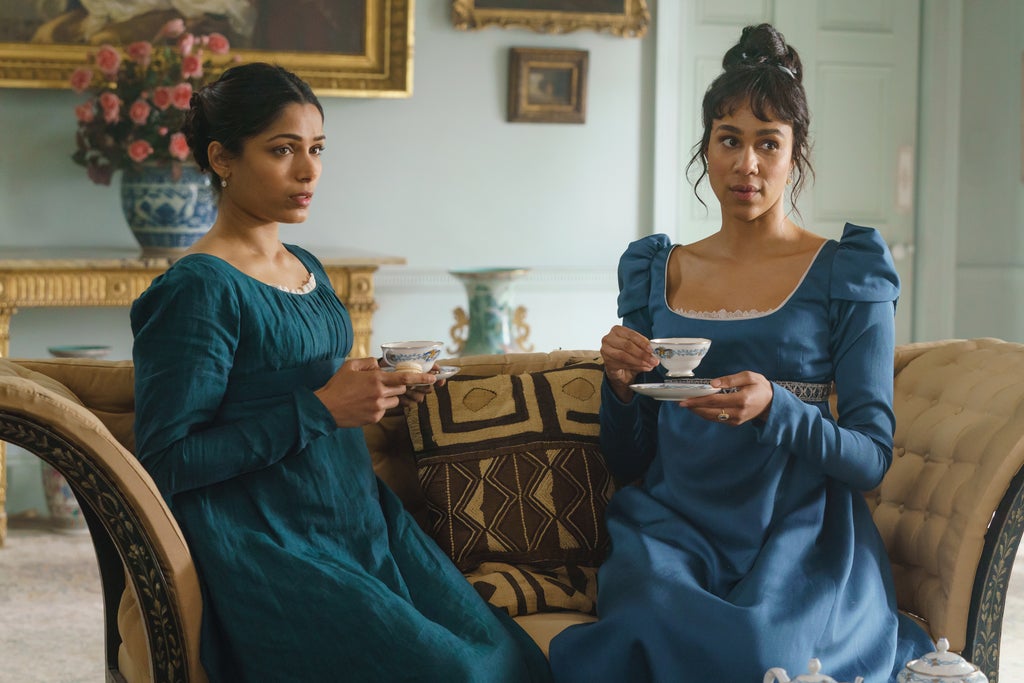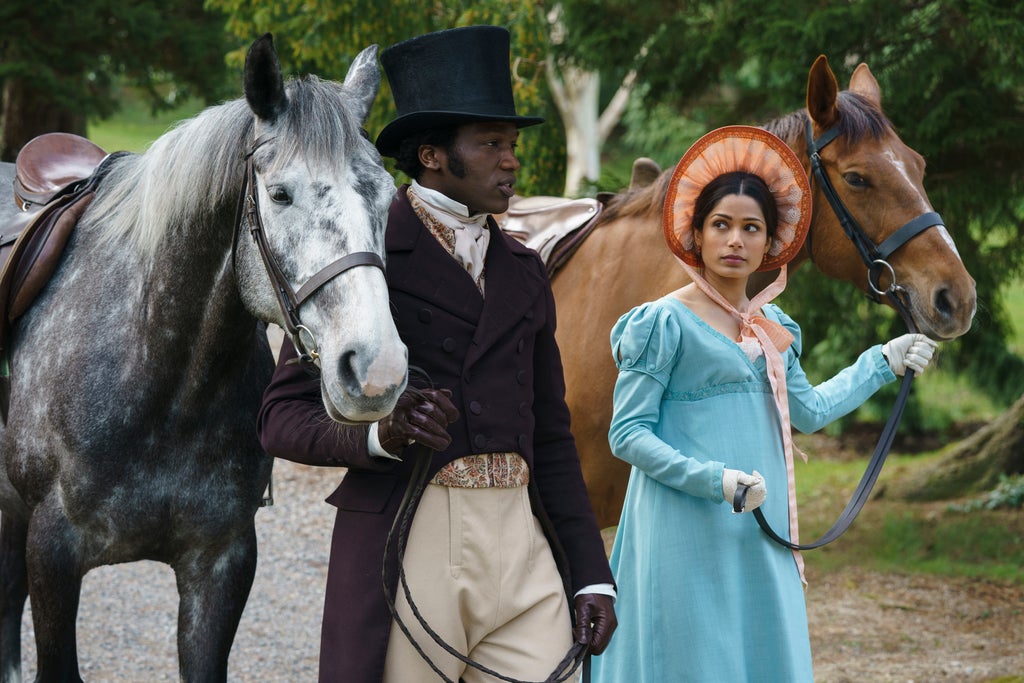While Bridgerton and Persuasion have been praised for their recent colour-blind casting, they’re certainly not the first of the regency-era genre to feature people of colour in leading romantic roles.
It was back in 2019 when Freida Pinto and Gemma Chan starred in Refinery29’s Shatterbox film Mr Malcolm’s List, a prequel to the short story written by Suzanne Allain that’s based in 19th-century London.
Three years later, Pinto returns for the full-length film version of Mr Malcolm’s List alongside Zawe Ashton (who replaces Chan). The movie follows what happens when Selena (Pinto) helps her friend Julia (Ashton) get revenge on Mr Malcolm (Sope Dirisu), a suitor who rejected her due to his list of qualifications for what he looks for in a partner. Ultimately, there are three people of colour in this love story, which period and regency-era dramas rarely represent.

“We were way before Bridgerton,” Pinto laughs during a phone call with Refinery29. “That is the truth. We even shot the [Mr Malcolm’s List] short film a year-and-a-half to two years before Bridgerton was even released.”
However, the actor of Indian heritage says that it wasn’t until the immense popularity of shows like Bridgerton — that starred Regé-Jean Page (of Zimbabwean and English heritage) in Season 1 and South Asian actors Simone Ashley and Charithra Chandran in Season 2 — that the new Mr Malcolm’s List was able to be produced.
“It took something like the feverish success of Bridgerton for investors to go, ‘Oh, people do come to watch people of colour falling in love in a regency period. OK fine, we’re gonna invest in it.”
Pinto’s co-star Ashton (whose mother is Ugandan and father is English) also has her own thoughts about the comparisons drawn between Mr Malcolm’s List and other regency dramas.
“What’s so interesting is to be on a promotional press journey with this movie, and having it be compared to Bridgerton,” she tells Refinery29 Australia. “Because I have never seen Kate Winslet or Keira Knightley or Matthew Macfadyen asked if the fifth period drama they’ve done in their career is anything like any of the other period dramas they have done.
“So, even in that hangs a tale that you are being compared and contrasted simply because you are rejuvenating the genre with representational casting.”

Ashton encourages audiences and the media to reflect on how they analyse and talk about film, because there can be “offence that lies underneath the very nature of comparing people or projects just because they happen to come from a minority space”.
Having said that, Ashton acknowledges the importance of multiculturalism on screen, because up until now, there’s been a “whole cross-section of society that was being denied escapism at the movies” as they weren’t represented on screen.
“I feel so proud of this film because there are two romantic leads who look completely different to the romantic leads [typically seen] in this genre of movie,” she says. “There’s me as the antagonist who looks completely different to the antagonists that you might usually have.
“Bridgerton is essentially still about a white family and the representational characters are in proximity to them. Whereas, in this movie, the characters of colour create the story arcs and I think that’s very important to note as a difference.”
Putting cultural background aside for a moment, Ashton also praises the representation of women in this movie as headstrong characters who won’t tolerate nonsense.
“I think my character Julia is extremely modern in her stance,” she explains. “She’s not going to let a man get away with disgracing her publicly. She’s not going to settle for anything less than equal treatment.”
Similarly, Pinto praises the characterisation of Julia, a woman who still hasn’t found her match after several seasons of courting “because she has high expectations for herself”.
“‘I’m very proud of her because she doesn’t see herself as someone who should be married off just because everyone else is getting married up. Of course, she feels the pressure and the way society glares at women who aren’t married in that period, but I commend her for her ability to not just give in.”
I feel so proud of this film because there are two romantic leads who look completely different to the romantic leads in this genre of movie.
zawe ashton
As for her own character, Pinto says Selena is similarly steadfast in her determination to not give in to the patriarchy.
“Mr Woodbury comes by with a proposition saying that she’s getting too old, and her family needs the money and he can provide. But she’s not going to give in to a 60-year-old man just because he has the money and he can provide,” she reflects.
“They [Selena and Julia] both believe that they want to make a match for love with someone who respects them.”
If Ashton was to say what her highlight of the film is, she refers to the beautiful bond that forms between Julia and Selena.
“There is a female friendship in this movie that plays as strongly and as powerfully as any of the romances,” she says, noting that it “feels very real and very nuanced”.
“So, I think that’s one thing that female audiences can really take away — it’s important to remember the regency era was a very inspiring time for women creatively, even though socially, it was extremely constricted.”
Mr Malcolm’s List is now available for rent and digital download.
Like what you see? How about some more R29 goodness, right here?
How Bridgerton Has ‘Subverted’ Hollywood Tokenism